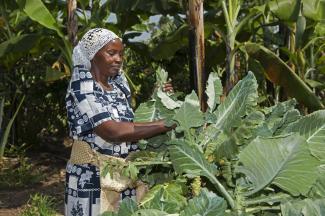UNCCD
Ecosystems and other land-related resources must be secured
 picture alliance / imageBROKER / FLPA / Wayne Hutchinson
picture alliance / imageBROKER / FLPA / Wayne Hutchinson
The UN document calls for ambitious commitments by governments – especially in Sub-Saharan Africa – and international financing. Not only is global food security at risk, the authors warn, but land problems also compound the climate crisis. The UNCCD is a sibling of the UN Framework Convention on Climate Change and the UN Convention on Biodiversity. All three were adopted at the Earth summit in Rio de Janeiro in 1992.
Due to unsustainable economic activity, 300 million hectares of useful land could be lost by 2050, the UNCCD experts warn. They reckon that up to 30 million square kilometres are lost every year. The impacts include more hunger, worse poverty, greater inequality and resource-driven conflicts. According to their report, land-related resources (including soil, ground water and biodiversity) currently facilitate economic activity worth an annual $ 44 trillion. That amounts to about half of global gross domestic product.
Land degradation and the climate crisis are mutually reinforcing. Desertification and drought affect 3 billion people around the world. As the report emphasises, they typically belong to the most vulnerable communities, with women, children and youths suffering most.
Core challenges
The core challenges, the authors argue, are over-exploitation and abuse of land-related resources. Distorted economic incentives lead to destructive investments in many sectors, including not only agriculture and forestry, but also mining, infrastructure development and urbanisation. Government policies are often destructive, and so is consumer demand, as the UN document emphasises.
Farms are indeed part of problem, with food production often driving land degradation. About 80 % of global deforestation is said to result from agrarian activities. Among other things, agriculture uses 70 % of freshwater resources. Moreover, 29 % of global greenhouse-gas emissions result from food production. The authors point out that some supposedly modern practices are unsustainable, including large-scale intensive monocultures or industrial-scale livestock operations.
Forest destruction, moreover, leads to considerable greenhouse-gas emissions. The report reckons that 125 million hectares of forests and grasslands were lost from 2000 to 2015. By 2050, an additional 300 million hectares are expected to become waste land at current trends. The impacts on food production would be harsh.
Improvements are possible
Things do not have to be this way. The UNCCD report is in favour of redesigning contemporary food systems. It spells out that a transition to plant diets, more eco-friendly agriculture and regenerative farming will help to restore land and boost people’s resilience (see Susanne Neubert on www.dandc.eu).
Urban planning matters too. The built environment is encroaching on the natural environment in many places. The UNCCD experts reckon that, by 2050, 6.7 billion people will live in urban areas – more than twice as many as today. Inadequate urban planning, however, can compound land problems. For example, it can cause flooding, putting people at risk and exacerbating soil erosion. Human settlements are also prone to overusing ground water. The authors point out that urban greening and reforms in urban land governance can restore an ecological balance even in cities.
In the eyes of the UNCCD experts, the Covid-19 pandemic has helped to reframe how policy-makers view land restoration. Human health, animal health and eco-system health are interrelated to an extent that experts speak of “One Health” (see Sabine Balk on www.dandc.eu). Covid-19 is a zoonotic disease which was transmitted from bats to humans. Such events become more likely where eco-systems are unbalanced. The implication is that restoring land has holistic benefits that transcend food production and rural livelihoods. Indeed, the resilience of local communities benefits from living in healthy environments.
Land governance must ensure people’s fundamental rights are respected moreover. People use land for their sustenance, and their livelihoods deserve to be protected, the authors argue. Indigenous peoples are especially at risk (see for example, Anup Dutta on www.dandc.eu). On the other hand, they and other marginalised grassroots communities have proven to be important partners for protecting and restoring land-related resources (as Carmen Josse argued on www.dandc.eu in 2019, considering Amazonian rainforests).
The gender angle
There is a gender angle too. In many developing countries, women do most of the farm work. They are particularly affected by land degradation. The UNCCD team therefore insists that they should be involved in decision making.
Global cooperation is the way forward, according to the report. Ecosystems must be restored, for humankind to enjoy a good future. Multilateral agreements and partnerships exist, but the UNCCD authors see a large gap between commitments made and actual implementation. They want governments and other parties to rise to their responsibility, which, in the case of high-income nations, includes delivering ODA (official development assistance).
Not all good intentions lead to good results, however. According to the UNCCD authors, it is wrong to focus only on fast-growing plants to regenerate forest and other eco-systems in Asia, Africa and Latin America. That approach leads to poorer eco-systems that are less able to store carbon, recharge ground water and serve as wildlife habitats.
The Global Land Outlook is the second of its kind. The first was published in 2017. The current edition assesses the global scenario, but also takes account of various international initiatives to improve matters, including the UN Decade of Ecosystem Restoration from 2021 to 2030 or the Sustainable Development Goals (SDGs) for example. The message is that decisive action can make a difference.
Reference
UN Convention to Combat Desertification, 2022: Global Land Outlook 2.
https://www.unccd.int/resources/global-land-outlook/glo2
Chimezie Anajama is currently an intern at D+C/E+Z. She recently received her masters degree in development management from Ruhr Universität Bochum.
vivienchime@gmail.com
Twitter: @mschimezie